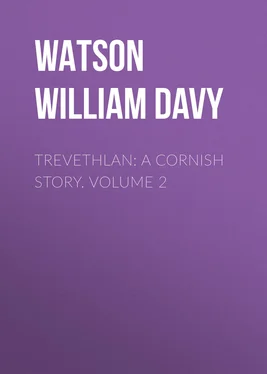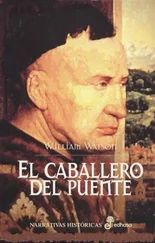William Watson - Trevethlan - A Cornish Story. Volume 2
Здесь есть возможность читать онлайн «William Watson - Trevethlan - A Cornish Story. Volume 2» — ознакомительный отрывок электронной книги совершенно бесплатно, а после прочтения отрывка купить полную версию. В некоторых случаях можно слушать аудио, скачать через торрент в формате fb2 и присутствует краткое содержание. Жанр: foreign_prose, foreign_antique, на английском языке. Описание произведения, (предисловие) а так же отзывы посетителей доступны на портале библиотеки ЛибКат.
- Название:Trevethlan: A Cornish Story. Volume 2
- Автор:
- Жанр:
- Год:неизвестен
- ISBN:нет данных
- Рейтинг книги:3 / 5. Голосов: 1
-
Избранное:Добавить в избранное
- Отзывы:
-
Ваша оценка:
- 60
- 1
- 2
- 3
- 4
- 5
Trevethlan: A Cornish Story. Volume 2: краткое содержание, описание и аннотация
Предлагаем к чтению аннотацию, описание, краткое содержание или предисловие (зависит от того, что написал сам автор книги «Trevethlan: A Cornish Story. Volume 2»). Если вы не нашли необходимую информацию о книге — напишите в комментариях, мы постараемся отыскать её.
Trevethlan: A Cornish Story. Volume 2 — читать онлайн ознакомительный отрывок
Ниже представлен текст книги, разбитый по страницам. Система сохранения места последней прочитанной страницы, позволяет с удобством читать онлайн бесплатно книгу «Trevethlan: A Cornish Story. Volume 2», без необходимости каждый раз заново искать на чём Вы остановились. Поставьте закладку, и сможете в любой момент перейти на страницу, на которой закончили чтение.
Интервал:
Закладка:
In the meanwhile his sister and he renewed their former acquaintance with the good folks of the hamlet, and to external appearance resumed the way in which they had lived before the late Mr. Trevethlan's death. It was a quiet, dreamy sort of life, of which a faint sketch was given in the outset of this narrative. They were born in a land of romance; the whole region was classic ground. From King Arthur's castle of Tintagel in the north-east, to Merlin's stone in Mount's Bay, respecting which an old prophecy—
"There shall land on the stone Merlyn
Those shall burn Paul's, Penzance, and Newlyn,"
was said to be fulfilled by some stragglers from the Spanish Armada, every field might be supposed the scene of some chivalrous exploit, or magical enchantment, or superstitious sacrifice. There dwelt the last of the British druids: their strange monuments were still standing on the wild moors and in the cultivated domains, on the desolate carns and among the crags of the sea-shore. Such was the oracular stone at Castle Trereen,—at that time not forced from its resting-place by sacrilegious hands, and requiring no chain to keep it from logging too far. Such was Lanyon Quoit, a cromlech on the moorland beyond Madron, and not very far from the battle-field, where the Saxon Athelstan finally defeated the Britons, and drove them to perish of hunger in the caves of Pendeen. The curious stranger still marks their strong fortresses, Castle Chun and Castle Dinas, occupying the highest ground between Mount's Bay and the Irish Sea; he may read the name of their chieftain, Rialobran, on his tombstone, Mên Skryfa, now prostrate among the herbage; and he may note the sanguinary nature of the struggle, in the title which it gained for the Land's End, of Penvonlas, or the Headland of Blood.
And, again, the customs of the country still kept alive some faint memorials of those heathen times, and of the accommodating spirit of the earliest Christian missionaries. To such an origin is ascribed the salutation of the orchards at Christmas, already referred to: the mistletoe of the apple was not so sacred as that of the oak, but neither was it despicable. And the bonfires of St. John's Eve were said to tell of the days when the cromlechs of Cam Brey were surrounded by a mystic grove, and the officiating priests hurried their human victims through purifying flames to the blood-stained altar.
Nor was the land less indebted for romantic associations to those fabulous historians, who peopled Britain with royalty, beauty, chivalry, and faery, and assigned to Cornwall the honour of producing the renowned Sir Tristan. Not a few hours were whiled away at Trevethlan Castle in discoursing of their marvellous adventures, their strange wandering towns of Camelot and Caerleon, and the general phantasmagoric character of their narratives. They plotted out the kingdom in an imaginary map, and whatever scenery they required, they regarded as existing and well known. Did they want a lake, from whence should issue a hand bearing a magic sword, they troubled not themselves with any mention of its landmarks: a forest perilous arose wherever they willed: a bridge to be defended, and therefore a stream, was always ready in the champion's path: you were introduced to a fountain as if you had drunk at it all your life. Undoubting faith in their own story was one of their most powerful fascinations: it transferred itself to their hearers, and a tale, which modern exactness would make incoherent and incredible, became credible from its very indistinctness. The Round Table romances present us with a fantastic Britain, which we may conceive to be still in being, like the paradise of Irem in the desert of Aden, and which the second-sight of imagination may yet conjure up in all its pristine glory.
Many of those old tomes, quartos and folios, whose florid binding attested their high estimation by early possessors, enriched the shelves of the castle library; and few of its proprietors were deterred from exploring their contents, by the mystic black-letter and antiquated French in which the stories were told. Under Polydore's guidance, Randolph and Helen had become acquainted with much of this legendary lore; and even their father sometimes deigned to take part in a conversation arising out of it.
But it was in vain now that Helen, in the hope of chasing away the cloud which hung continually upon her brother's brow, strove to recall his attention to these studies of the old time. The down had been brushed from the butterfly's wing. She strolled with him along the beach, and she sat with him in Merlin's Cave, in spite of the wintry weather; but it was impossible to bring back the mood in which he listened to "Trevethlan's farewell," on the eve of their departure for London. He was fond of roaming through the desolate state rooms, rapt in deep meditation, and only roused when the wind, rushing through some crevice, waved the tapestry of the walls with a rustling sound, and made the dim figures portrayed upon it seem for a moment endued with life. Sometimes he would be found in the picture-gallery, gazing earnestly on the portrait of his father, and seeming, by the expression of his countenance, eager to evoke from the mimic lips an answer to some question which was struggling in his breast. His old teacher noted his moodiness with anxiety, but in silence, and made no attempt to forestall the explanation, which he felt sure must come of itself before long.
CHAPTER III
The heart, surrendered to the ruling power
Of some ungoverned passion every hour,
Finds, by degrees, the truths that once bore sway
And all their deep impression wear away:
So coin grows smooth in traffic current passed,
Till Cæsar's image is effaced at last.
The mistress of Pendarrel Hall never visited it without experiencing a renewal of many an ancient spring of grief. There were not a few spots in the park, sequestered from the more frequented paths, which she could not look upon without bitter regret, yet which she was always sure to explore within a few days of her arrival, so much of pensive pleasure mingled with the pain. But the influence of such reminiscences was of short duration, and the temporary weakness was soon succeeded by that permanent animosity to the owners of Trevethlan Castle, which had become the ruling passion of her life. She would climb an eminence in the neighbourhood, from which the old gray towers were visible, and think, with fresh exasperation, of the obstinacy or the pride which still detained them from her grasp.
But now she came to her home, with a fond belief that the enemy was at last delivered into her hand. Previously, there seemed no limit to the contention. Now, a few weeks must decide it. Michael Sinson had returned to town before the departure of his patroness, had matured his plans, had obtained her sanction to carrying them out, and had been introduced by her husband to his highly-respected solicitor, Mr. Truby. That gentleman could only assure his client, after a careful perusal of Sinson's statement, that, if it did not break down in court, there could be no doubt whatever that Mr. Randolph Trevethlan would be held to be an intruder upon the castle property, and that immediate possession would be given to him, Mr. Trevethlan Pendarrel. And, as Michael vouched for the perfect soundness of his evidence, Mr. Truby received directions to commence proceedings forthwith. "Let the suit be pressed forward," Mrs. Pendarrel said, "with the utmost possible despatch."
That matter settled, she left London with her daughter; her husband gladly making his official duties a plea for remaining in May Fair. Yet Esther was not altogether at her ease. Plain and straightforward as was Sinson's story, and completely as it destroyed the validity of the late Mr. Trevethlan's marriage, she still suspected there was some unseen flaw. She often thought of Mr. Truby's qualification—if the case did not break down in court. Who was this very important witness that Sinson had so opportunely discovered? And then, as the notion of fraud stole into her mind, she asked herself, what would be the motive; with what object could Sinson have devised his scheme? And again she questioned herself, with some alarm, as to the extent to which she had authorized the proceedings of her protégé. She had communicated with him once or twice by letter. And the uneasiness expressed in these reflections was somewhat increased by Michael's recent demeanour. He wore a look of intelligence, and assumed an air of importance, seeming to discover a consciousness of some hidden power. A sense of superiority appeared to mingle with his fawning subserviency, such as might mark the carriage of Luke in Massinger's play. But Mrs. Pendarrel soon wrapped herself in her pride, and forgot all her suspicions.
Читать дальшеИнтервал:
Закладка:
Похожие книги на «Trevethlan: A Cornish Story. Volume 2»
Представляем Вашему вниманию похожие книги на «Trevethlan: A Cornish Story. Volume 2» списком для выбора. Мы отобрали схожую по названию и смыслу литературу в надежде предоставить читателям больше вариантов отыскать новые, интересные, ещё непрочитанные произведения.
Обсуждение, отзывы о книге «Trevethlan: A Cornish Story. Volume 2» и просто собственные мнения читателей. Оставьте ваши комментарии, напишите, что Вы думаете о произведении, его смысле или главных героях. Укажите что конкретно понравилось, а что нет, и почему Вы так считаете.












